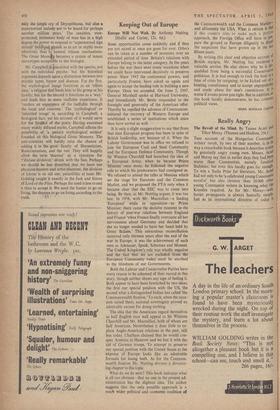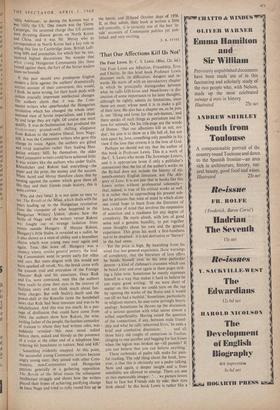Really Angry
The Revolt of the Mind. By Tamas Aczel and
Tibor Meray. (Thames and Hudson, 35s.) THIS account of the Hungarian Communist writers' revolt, by two of their number, is in its way a remarkable book because it describes action by genuinely angry young men. Messrs. Aczel and Meray say that in earlier days they had been worse than Communists, namely fanatical Stalinists; but even this hardly goes far enough. To win a Stalin Prize for literature, Mr. Aciel had not only to be 'a celebrated young Communist novelist' but also cleverer than 10,000 other young Communist writers in knowing what the Kremlin required. As for Mr. Meray—well, Soviet propaganda is always basically simple. Just as its international directive of today is 'vilify Adenauer,' so during the Korean war it was 'vilify the US.' One means was the 'Germ Campaign,' the invented charge that US airmen were dropping disease germs on North Korea and China, and it was Mr Meray who as correspondent in North Korea had a key role in selling this line to Cambridge dons. British Left- wing MPs and journalists, for which feat he. too, received highest decorations No wonder that when young Hungarian Communists like these turned against them, the fury of the Soviet leaders knew no bounds.
If this past should also predispose English readers a little against the authors' dramatically written account of their conversion, this would. I think, be quite wrong, for their book deals with certain crucially important intellectual changes. The authors claim that it was the Com- munist writers who spearheaded the Hungarian revolution which has changed the whole inter-
national view of Soviet imperialism, and I think by and large they are right. Of course one must qualify. It was de-Stalinisation that produced the re%olutionary ground-swell, shifting allegiance from Rakosi to the relative liberal, Imre Nagy: still, it was the Communist writers who gave this Change its voice. Again, the authors are gifted and vivid journalists rather than leading Hun- garian writers. Still, by themselves. the older non-Communist writers could have achieved little. It was writers like the authors who under Stalin, Khrushchev and Rakosi had everything—the Paper and the print, the money and the success. When Aczel and Meray therefore claim that by turning against the system which gave them all this they and their friends made history. this is quite correct Why did they turn? It is not quite so easy to say. The Revolt of the Mind, which deals with the Years leading up to the Hungarian revolution from the viewpoint of what happened in the Hungarian Writers' Union, shows how the battle of Nagy and the writers versus Rakosi was fought out in strange isolation from events outside Hungary. If Matyas Rakosi, Hungary's little Stalin, is revealed as a sadist, he is also shown as a man of ability and a boundless charm which won young men over again and again. True, this wore. off. Hungary was a Country where, amidst general penury, the lead- ing Communists went in pretty early for villas and cars. But mere disgust with this would not have sparked off revolt. No, the break came with the treason trial and execution of the Foreign Minister Rajk and his associates. Once It* and Co. were convicted, men like the authors were ready 'to close their eyes in the interest of Stalinist unity and not think much about fan- tastic charges. But with Stalin's death and the Power-shift in the Kremlin came the bombshell news that Rajk had been innocent and was to be rehabilitated. And this was too much. In a pas- sage of disillusion that could have come from 1984, the authors show how Rakosi, the wise, smiling father of the people, the fearless unmasker of traitors to whom they had written odes, was suddenly revealed—`this man stood naked before them, naked and bloody as the possessor of a voice at the other end of a telephone line, ordering his henchmen to torture, beat and kill.'
Something evidently snapped. At this point, the successful young Communist writers became angry young men; they joined with other Com- munists, non-Communists and Hungarian Patriots generally in a gathering opposition. The Revolt of the Mind traces the subsequent intellectual struggle and shows how the writers Placed their hopes of achieving purifying change in Imre Nagy. and tried to rally round him up to
the heroic and ill-fated October days of 1956. If, as they admit, their book is written a little self-centredly, it is certainly one of the best 'in- side' accounts of Communist politics yet pub- lished. and very exciting.
I. R. FYVEL



































 Previous page
Previous page